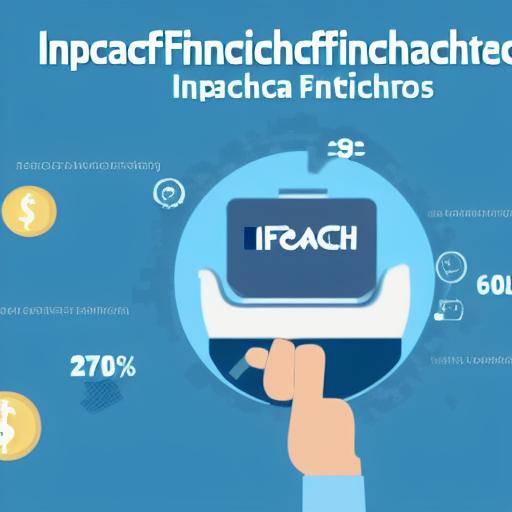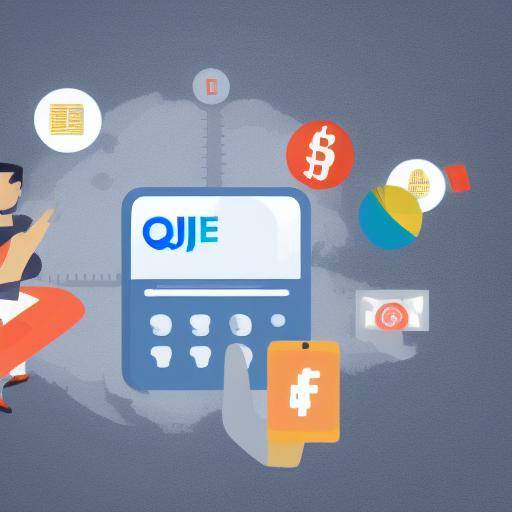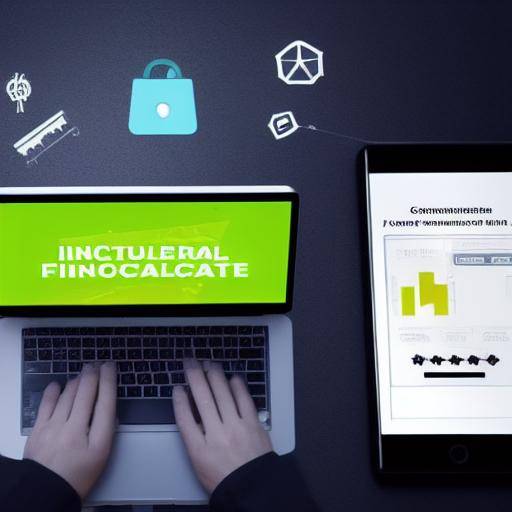
Introduction
The Fintech revolution has radically transformed the panorama of financial services, with a significant impact on the accessibility and inclusion of segments of the population that have historically had difficulties in participating in the financial system. In this article, we will explore in detail the impact of financial technology (Fintech) on the accessibility of financial services, its crucial role in economic and social inclusion, as well as the innovative role of technology in transforming these key areas.
History and Background
The term Fintech comes from the combination of the words "finances" and "technology", and refers to the application of technological innovation in the field of financial services. This concept has its roots in the emergence of electronic banking in the 1970s and 1980s, but it is in the last decade that has experienced explosive growth.
Since its inception, Fintech has challenged the traditional model of financial services, promoting inclusion through innovative and accessible solutions. Examples such as crowdfunding, peer-to-peer loans, mobile payments and artificial intelligence applied to financial management have expanded the possibilities of access to financial services for a wide range of individuals and companies.
In this regard, the Fintech has generated a significant change in democratizing access to financial services, offering more flexible, transparent and affordable alternatives for consumers and entrepreneurs from different profiles.
Detailed Analysis
The Fintech has not only simplified access to financial products, but also addressed inclusion challenges. For example, thanks to technology, products and financial services are more personalized and tailored to the specific needs of each individual, reducing traditional barriers to inclusion. This inclusive approach has allowed for greater participation of disadvantaged or underserved persons in the financial system, promoting greater equity and social justice.
In addition, Fintech has provided innovative solutions that promote the inclusion of sectors such as small and medium-sized enterprises, facilitating their access to financing through online loan platforms or collective financing.
Despite progress, financial inclusion remains a challenge in many regions of the world. However, Fintech remains a key engine to overcome these barriers, providing creative and efficient solutions.
Comprehensive review
In a global context, there have been notable initiatives that combine Fintech with the commitment to financial inclusion. For example, in developing countries, mobile banking solutions and digital remittance services have contributed significantly to the inclusion of rural communities and people with limited resources.
On the other hand, in developed economies, Fintech has played a crucial role in expanding financial services for marginalized groups, such as young people or older adults, through simplified financial management tools and innovative savings options.
It is essential to note that Fintech is not an isolated solution to financial inclusion, but must be part of a comprehensive approach that includes public policies, financial education and collaboration between financial institutions and technology entities.
Comparative analysis
The intersection between access, inclusion and technology is an area of vital importance. On the one hand, access to financial services has been driven by technology, allowing individuals and companies to conduct transactions, access loans or investments, and manage their finances from mobile devices, removing geographical barriers and reducing transaction costs.
With regard to inclusion, technology has expanded the scope of financial services, allowing traditionally marginalized groups to participate in financial transactions, generate credit records and access products tailored to their specific needs.
Technology has proven transformative strength by providing innovative solutions that address traditional access barriers, such as lack of bank accounts, limited credit history and physical distance to financial branches.
Practical Tips and Accessible Recommendations
For those seeking to maximize the opportunities offered by the Fintech in terms of accessibility and inclusion, it is essential to follow certain key steps:
- Financial Education: Leverage the educational resources and financial management tools offered by Fintech platforms to improve understanding of personal and business financial management.
- Service Diversification: Explore the wide range of financial products and services offered by Fintech, including loans, insurance, investments and payments, to find solutions tailored to specific needs.
- Transparency Assessment: By using Fintech services, it is essential to evaluate transparency in rates, terms and conditions, as well as the protection of privacy and security of financial information.
- Active participation: Stay informed about the latest trends and developments in the Fintech field, as well as engage in communities that promote financial and technological inclusion.
Industry Perspectives and Expert Reviews
The perspectives of the Fintech industry point to an exciting and promising future in terms of accessibility and inclusion. Experts in the field highlight the capacity of technology to continue to play a crucial role in reducing financial gaps and expanding access to financial services at the global level.
The testimony of industry leaders highlights the importance of collaboration between traditional financial entities and Fintech companies to maximize the positive impact on financial inclusion, promoting innovation and the development of increasingly inclusive and effective solutions.
Case Studies and Practical Applications
Fintech's practical applications in the area of financial inclusion are evident through numerous case studies in different parts of the world. For example, online microcredit platforms have allowed entrepreneurs in regions with limited access to financial services to start or expand their businesses, generating a positive impact on their communities.
In addition, technology-supported financial education programmes are empowering individuals to make informed financial decisions, while providing them with tools to access essential financial services in a simple and convenient manner.
Future Trends and Predictions
As technology and innovation continue to evolve, the future of the Fintech in terms of accessibility and financial inclusion is bright. The continued expansion of Fintech solutions, the development of disruptive technologies such as artificial intelligence and blockchain, as well as the growing collaboration among sector actors, are expected to help overcome persistent challenges in global access and financial inclusion.
At the same time, a greater approach is envisaged in adapting Fintech solutions to the specific needs of underserved communities, as well as in promoting inclusive and sustainable practices in the design and implementation of digital financial services.
Conclusions
In short, the impact of Fintech on accessibility and financial inclusion is undeniable. The combination of technology and innovation has paved the way for greater participation in the financial system, reducing traditional barriers and empowering individuals and communities. As Fintech continues its progress, it is expected that its role in promoting more equitable and globally accessible financial inclusion will remain crucial in the future.
FAQs
How has Fintech contributed to financial inclusion?
The Fintech has allowed access to financial services through innovative solutions and digital platforms that simplify financial management, eliminating traditional barriers and adapting to the needs of different segments of the population.
What challenges does Fintech face in terms of financial inclusion?
Despite its progress, Fintech faces challenges such as information security, the digital divide and financial regulation, which must be addressed to ensure effective and sustainable financial inclusion.
What types of financial services does Fintech offer to promote inclusion?
The Fintech offers a wide range of financial services, including peer-to-peer loans, mobile payments, microcredits, investment management, personalized insurance, among others, that adapt to the diverse needs of users.
What is the impact of Fintech on the inclusion of small and medium-sized enterprises?
The Fintech has expanded the access of small and medium-sized companies to financing through online loan platforms, collective financing and financial management solutions adapted to business needs.
What is the role of technology in promoting financial inclusion?
Technology plays a key role in simplifying access to financial services through digital platforms, promoting financial education and empowering users to make informed financial decisions.
What are Fintech's future prospects for financial inclusion?
Fintech is expected to continue its expansion and development, adapting solutions to the specific needs of different population groups, promoting more equitable and sustainable financial inclusion in the future.
Through this comprehensive analysis, it is clear that Fintech has had a significant impact on accessibility and financial inclusion, opening up new opportunities and horizons for individuals and companies around the world. With the continued development and evolution of the Fintech, it is foreseeable that its role in promoting more equitable and globally accessible financial inclusion remains crucial in the future.






















































